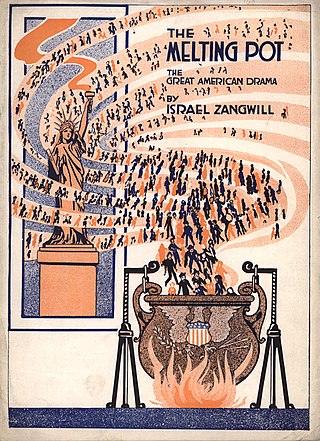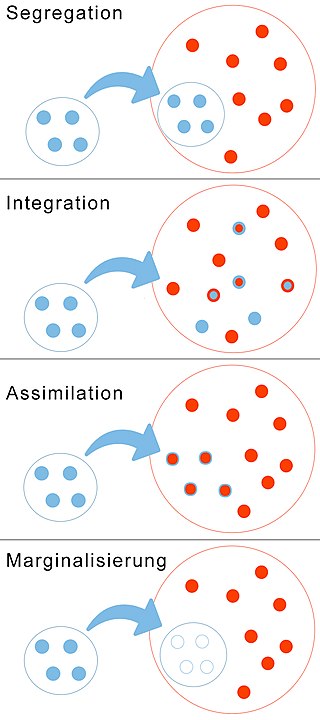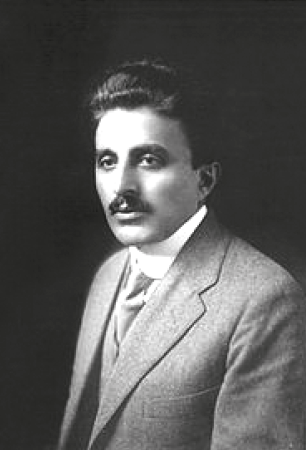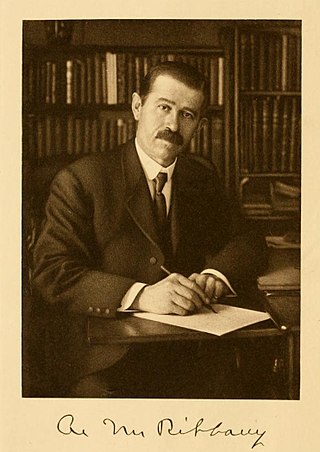Related Research Articles

Arab Americans are Americans of Arab ancestry. Arab Americans trace ancestry to any of the various waves of immigrants of the countries comprising the Arab World.

The melting pot is a monocultural metaphor for a heterogeneous society becoming more homogeneous, the different elements "melting together" with a common culture; an alternative being a homogeneous society becoming more heterogeneous through the influx of foreign elements with different cultural backgrounds, possessing the potential to create disharmony within the previous culture. It can also create a harmonious hybridized society known as cultural amalgamation. Historically, it is often used to describe the cultural integration of immigrants to the United States. A related concept has been defined as "cultural additivity."

Acculturation is a process of social, psychological, and cultural change that stems from the balancing of two cultures while adapting to the prevailing culture of the society. Acculturation is a process in which an individual adopts, acquires and adjusts to a new cultural environment as a result of being placed into a new culture, or when another culture is brought to someone. Individuals of a differing culture try to incorporate themselves into the new more prevalent culture by participating in aspects of the more prevalent culture, such as their traditions, but still hold onto their original cultural values and traditions. The effects of acculturation can be seen at multiple levels in both the devotee of the prevailing culture and those who are assimilating into the culture.

Bassam Tibi, is a Syrian-born German political scientist and professor of international relations specializing in Islamic studies and Middle Eastern studies. He was born in 1944 in Damascus, Syria to an aristocratic family, and moved to West Germany in 1962, where he later became a naturalized citizen in 1976.
Cultural assimilation is the process in which a minority group or culture comes to resemble a society's majority group or assume the values, behaviors, and beliefs of another group whether fully or partially.
The phrase fresh off the boat(FOB), off the boat(OTB), are sometimes-derogatory terms used to describe immigrants who have arrived from a foreign nation and have yet to assimilate into the host nation's culture, language, and behavior, but still continue with their ethnic ideas and practices. Within ethnic Asian circles in the United States, the phrase is considered politically incorrect and derogatory. It can also be used to describe the stereotypical behavior of new immigrants as, for example, their poor driving skills, that they are educated yet working low-skilled or unskilled jobs, and their use of broken English. The term originates in the early days of immigration, when people mostly migrated to other countries by ship. "Fresh off the Boeing 707" is sometimes used in the United States as a variation, especially amongst East, South and Southeast Asian immigrants. In the United Kingdom "fresh off the boat" are referred to as freshies or simply FOBs.
Mizrahi Jews, also known as Mizrahim (מִזְרָחִים) or Mizrachi (מִזְרָחִי) and alternatively referred to as Oriental Jews or Edot HaMizrach, are a grouping of Jewish communities comprising those who remained in the Land of Israel and those who existed in diaspora throughout and around the Middle East and North Africa (MENA) from biblical times into the modern era.

Arabization or Arabisation describes both the process of growing Arab influence on non-Arab populations, causing a language shift by the latter's gradual adoption of the Arabic language and incorporation of Arab culture, after the Muslim conquest of the Middle East and North Africa, as well as the Arab nationalist policies of some governments in modern Arab states toward non-Arabic speaking minorities, including Algeria, Iraq, Kuwait, and Sudan.
Forced assimilation is an involuntary process of cultural assimilation of religious or ethnic minority groups during which they are forced to adopt language, national identity, norms, mores, customs, traditions, values, mentality, perceptions, way of life, and often religion and ideology of established and generally larger community belonging to dominant culture by government. Also enforcement of a new language in legislation, education, literature, worshiping counts as forced assimilation. Unlike ethnic cleansing, the local population is not outright destroyed and may or may not be forced to leave a certain area. Instead the assimilation of the population is made mandatory. This is also called mandatory assimilation by scholars who study genocide and nationalism. Mandatory assimilation has sometimes been made a policy of new or contested nations, often during or in the aftermath of a war. Some examples are both the German and French forced assimilation in the provinces Alsace and Lorraine, and some decades after the Swedish conquests of the Danish provinces Scania, Blekinge and Halland the local population was submitted to forced assimilation, or even the forced assimilation of ethnic Teochews in Bangkok by the Siam government during World War I until the 1973 uprising.

Arab Jews is a term for Jews living in or originating from the Arab world. The term is politically contested, often by Zionists or by Jews with roots in the Arab world who prefer to be identified as Mizrahi Jews. Many left or were expelled from Arab countries in the decades following the founding of Israel in 1948, and took up residence in Israel, Western Europe, the United States and Latin America.

The phenomenon of large-scale migration of Christians is the main reason why Christians' share of the population has been declining in many countries. Many Muslim countries have witnessed disproportionately high emigration rates among their Christian minorities for several generations. Today, most Middle Eastern people in the United States are Christians, and the majority of Arabs living outside the Arab World are Arab Christians.

Georgina Rizk is a Lebanese model, socialite, and beauty queen. She represented Lebanon at the Miss Universe pageant and won, making her the first Lebanese and Middle Eastern/West Asian woman to win that title. Prior to this, she was crowned Miss Lebanon 1970 and represented Lebanon at the Miss World competition but failed to place.

Ameen Rihani (Amīn Fāris Anṭūn ar-Rīḥānī), was a Lebanese American writer, intellectual and political activist. He was also a major figure in the mahjar literary movement developed by Arab emigrants in North America, and an early theorist of Arab nationalism. He became an American citizen in 1901.
Lebanese Americans are Americans of Lebanese descent. This includes both those who are native to the United States of America, as well as immigrants from Lebanon.

Abraham Dimitri Rihbany known as Abraham Mitrie Rihbany was an American theologian, philologist and historian of Greek Orthodox Lebanese descent.
The legal and social strictures that define White Americans, and distinguish them from persons who are not considered white by the government and society, have varied throughout the history of the United States.

Syrian Americans are Americans of Syrian descent or background. The first significant wave of Syrian immigrants to arrive in the United States began in the 1880s. Many of the earliest Syrian Americans settled in New York City, Boston, and Detroit. Immigration from Syria to the United States suffered a long hiatus after the United States Congress passed the Immigration Act of 1924, which restricted immigration. More than 40 years later, the Immigration Act of 1965, abolished the quotas and immigration from Syria to the United States saw a surge. An estimated 64,600 Syrians immigrated to the United States between 1961 and 2000. Memphis, Tennessee.

Evelyn Shakir (1938–2010) was a literary scholar. She was a pioneer in the study of Arab American literature, publishing some of the first academic papers to name Arab American literature as a field. She published several books, including Remember Me to Lebanon: Stories of Lebanese Women in America, a 2007 short story collection that won the Arab American National Book Award. Her memoirs were published posthumously as Teaching Arabs, Writing Self: Memoirs of an Arab-American Woman. She is remembered on the Boston Women's Heritage Trail, and the Arab American Book Award nonfiction prize was renamed in her honor.

In 2004, Metro Detroit had one of the largest settlements of Middle Eastern people, including Arabs and Chaldo-Assyrians in the United States. As of 2007 about 300,000 people in Southeast Michigan traced their descent from the Middle East. Dearborn's sizeable Arab community consists largely of Lebanese people who immigrated for jobs in the auto industry in the 1920s, and of more recent Yemenis and Iraqis. In 2010 the four Metro Detroit counties had at least 200,000 people of Middle Eastern origin, excluding Jews. Bobby Ghosh of TIME said that some estimates gave much larger numbers. From 1990 to 2000 the percentage of people speaking Arabic in the home increased by 106% in Wayne County, 99.5% in Macomb County, and 41% in Oakland County.

Arab-American literature is an ethnic American literature, comprising literary works by authors with Arab origins residing in the United States. The Arab diaspora has its beginnings in the late 19th century, when Arab groups from the Ottoman Empire moved to North America. This immigration occurred in three separate phases, with distinct themes, perspectives, style, and approach to Arab culture embedded in the literature created by each respective phase.
References
- ↑ Waïl S. Hassan, Immigrant Narratives: Orientalism and Cultural Translation in Arab American and Arab British Literature. Oxford University Press, 2011. Pp. 100-111.
- ↑ Tanyss Ludescher, "From Nostalgia to Critique: An Overview of Arab American Literature", MELUS 31.4 (2006): 93-114.
- ↑ Sacvan Bercovitch, Cyrus Patell, The Cambridge History of American Literature: Prose Writing, 1910-1950, Cambridge University Press, 2002. p.522.
- 1 2 Elmaz Abinader, "Children of al-Mahjar: Arab American Literature Spans a Century" Archived 2011-07-24 at the Wayback Machine , 2000; accessed 17 July 2010
- 1 2 Pauline Kaldas, Khaled Mattawa, "Introduction", Dinarzad's Children: An Anthology of Contemporary Arab American Fiction, University of Arkansas Press, 2009. pp.xvi, xviii.
- 1 2 3 Gregory Orfalea, The Arab Americans: A History, Interlink Books, 2006. pp.50, 60, 69.
- ↑ e.g.,"Pencils Speak Democracy", in Boys' Life Dec 1953, p.67. (accessed via Google Book search, 17 July 2010)
- ↑ Lecture brochure, accessed 17 July 2010.
- ↑ Amir B. Marvasti, Karyn D. McKinney, Middle Eastern lives in America, Rowman & Littlefield, 2004. p.5.
- 1 2 Werner Sollors, Ethnic Modernism, Harvard University Press, 2008. pp.194–199.
- ↑ Amritjit Singh, Peter Schmidt, Postcolonial Theory and the United States: Race, Ethnicity, and Literature, Univ. Press of Mississippi, 2000. p.334 n.27.
- ↑ Kathleen Benson, Philip M. Kayal, Museum of the City of New York, A Community of Many worlds: Arab Americans in New York City, Syracuse University Press, 2002. p.31.
- ↑ Werner Sollors, Beyond Ethnicity: Consent and Descent in American Culture, Oxford University Press US, 1987. p.74.
- ↑ Hassan, Waïl S. "The Rise of Arab-American Literature: Orientalism and Cultural Translation in the Work of Ameen Rihani", American Literary History 20.1/2 (2008): 245-275.
- ↑ Waïl S. Hassan, Immigrant Narratives: Orientalism and Cultural Translation in Arab American and Arab British Literature. Oxford University Press, 2011. Pp. 100-111.